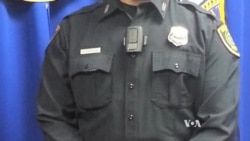The recent violence in Baltimore, Maryland follows incidents around the nation in recent months in which police have been accused of misbehavior. As a result of such accusations, both police departments and civil rights groups have called for law enforcers to wear body cameras that can record their activities. There are many questions about the cost of such camera systems, the management of the video they capture and the limits on what the technology can do.
Challenges
Houston Chief of Police Charles McClelland supports the use of body cameras, but he said they also present problems. “The type of equipment, the placement of equipment, the downloading time, and storage space all of those are significant challenges,” he said.
For the past two years, the Houston Police Department has experimented with cameras, deploying about 100 of them on officers each day.
But McClelland said deploying cameras on a few thousand officers and then managing all the video they produce will cost a lot of money.
“We will be paying officers overtime for doing their downloading and indexing of these videos,” he explained, adding that those videos can only show a limited perspective of any incident.
The body cameras used by police usually offer a wide-angle view of what is in front of the lens, much like the small consumer cameras.
That view leaves a lot out, Chief McClelland said.
“An officer may turn his or her head and see something, but the video camera that is in the middle of their chest is pointing straight ahead,” he noted.
Most officers who have worn the cameras, here and in other cities, are very much in favor of them.
In demand
Rita Watkins, the executive director of the Law Enforcement Management Institute of Texas, said there is statewide demand for body cameras.
“I can tell you that right now there are chiefs who are budgeting, within their budget and asking their community leadership for the funds to initiate and start a fund for the body camera program,” she stated.
She said legal experts also are considering how photos and videos taken by average citizens should be handled.
“We also have the public that is capturing video. So how do they maintain it and what is their duty and responsibility for making that information available to law enforcement?” she asked.
Both she and McClelland also are concerned about what happens if a video file becomes corrupted or disappears.
“This technology is man-made and at some point any man-made object will malfunction,” he said, adding that such a technical glitch could ignite discord in a city like Baltimore, where there already is distrust of the police.
McClelland also worries that routine communication between officers and citizens will diminish because of the cameras.
“The officer is recording the citizen and the citizen may be using his or her cellphone to record the officer,” he said.
Body cameras offer benefits, McClelland said, but they also represent a continuing financial burden for police as cameras become obsolete every few years and must be replaced by newer, better ones.





